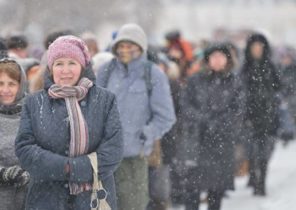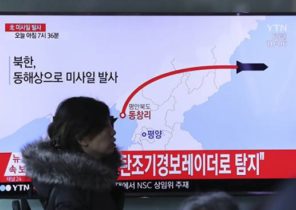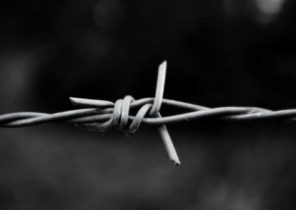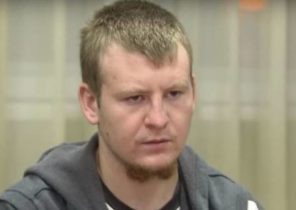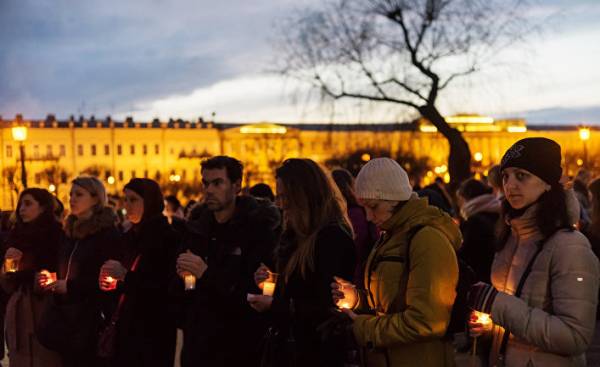
April 3 at metro St.-Petersburg the attack occurred. 14 people died, including the main suspect in the Commission of the offense, in hospitals there are another 55 injured, some very or just a serious condition. After weeks no one has claimed responsibility. It is incomprehensible the attack with more or less clear consequences.
A terrorist attack, accidentally or intentionally, is literally overflowing with meanings, allusions and connotations. On the day of its Commission in St. Petersburg with the participation of Vladimir Putin hosted the media forum of the Russian popular front (onf) — Pro-government social organizations, performing including the role of the personnel reserve of power. Onf is waiting for, but did not wait for a visual signal on its participation in presidential elections as political support of the “main candidate”. Being on the forum, Putin received the news of the terrorist attack. After meeting with security officials about the incident, he had spent hours of negotiations with Alexander Lukashenko, the visit which was timed to the anniversary of the formation of the Union state of Russia and Belarus, but on the resolution of chronic dispute about the price of Russian hydrocarbons. In Saint Petersburg Lukashenko came immediately after talks in Turkmenistan. The next day, in Moscow, Putin met Uzbek President Shavkat Mirziyoev, who arrived for the signing of an impressive package of documents on cooperation, the economic weight of which is estimated at $ 16 billion.
A week before the terrorist attacks in many cities of Russia there was a wave of protests, initiated primarily on today Russian opposition leader Alexei Navalny. Formally, they were dedicated to exposing corruption by the Prime Minister Dmitry Medvedev, but actually every city had its own list of claims to power. In Saint-Petersburg of the action gathered up to 10 thousand people (approximately the same as in Moscow) and took place against the backdrop of raging scandal surrounding the transfer of the Russian Orthodox Church of St. Isaac’s Cathedral. This was followed in different regions of Russia were the protests of truckers, dissatisfied with the system of charging for transportation for the family of Arkady Rotenberg, a close friend of the Russian President with his early years. In Dagestan, the protests have not abated still. The situation is so acute that the Russian government at some point were willing to use to suppress troops Regardie.
Russia, Belarus, Orthodoxy, Central Asia, radical Islam. 22-year-old Uzbek from a Kyrgyz Osh with a Russian passport, which is considered the main suspect, was a good fit for the role of a match capable of igniting a whole heap of political piles. But the gravitas limited to, breaking into the obscurity of motives.
The first message was about, it turned out later that the explosion was one, but it was defused another explosive device. First it was said that the bomb planted, then what did the suicide bomber. Edition of “RBC” published “insider” of the security services. Supposedly they were aware of the impending attack, but it completely prevented. This information is, to put it mildly, a strange passage: “the investigators found that all the SIM cards were purchased in the markets and is not tied to real people, so we were forced to restrict the wiretapping of conversations of militants, hoping to eventually find them or at least figure out the details of their plans.” Hard to explain why, having mobile numbers and listening to them, the security services could not establish their location and calculate the owners.
Hot on the heels of the Russian media started to declare the suspects, on the basis of the data of the names of the dead and the appearance of the people passing in front of surveillance cameras in the area of the attack. First suspicions fell on the man typical appearance with the beard in Oriental headdress. It turned out that this former Russian military from Bashkortostan, has become in recent years a staunch Muslim. No relation to the explosion, he had not. The next object of attention was a student from Kazakhstan, of all suspicion against which boiled down to the fact that he died in the explosion and were from Muslim countries. A closer examination of his background proved that he was an innocent bystander.
The investigation caught the third candidate for the role of a suicide bomber. In the carriage where the explosion occurred, among not amenable to the identification of the remains of several people were found decapitated. Calm, with open eyes face quickly identified. Slipped reports that a severed hand belonged to the same body, was discovered the wires of the explosive device. According to the surveillance cameras and social networks were quickly set deceased Akbarjon Jalilov, that an Uzbek from Osh with a Russian passport, which celebrated its 22nd birthday on 1 April, the day before the attack.
About this person we already know a lot. Intelligence agencies of Kyrgyzstan confirmed his identity and biography. The journalists toured the places where he lived and worked, and interviewing his friends. Jalilov grew up in Osh, received a Russian passport there in 16 years at the Russian Consulate. In this he was helped by a father who worked many years in Russia. Having a passport Jalilov left for St. Petersburg, earning there the sushi and the service station, engaged in martial arts, but not very zealously, shooting quite expensive apartments. Prayer was not made in a particular religion is not seen. In the last month, lived alone.
Allegedly, a month before his death Jalilov visited relatives in Osh and came back a different person, introverted and focused. From this, the assumption is that there he was recruited by some radical Islamist group. No other reason to assume that he suddenly decided to become a Shahid, no. Maybe Jalilov and got in some Islamic analogue of the adolescent “groups of death”, but no notes and video messages in the style of “Nya. While” not detected. The motives of his action, if the attack really did it, no.
In 2001-2010 in the Moscow metro were committed by four terrorist attack. All of them had at the morning and evening rush hours. The current terrorist attack in St. Petersburg was made at 14.40 is the least crowded for the metro time. I wanted to say in such a choice of time of contamination, if he is, is unclear. It is unlikely that he chose his moment, when Putin will be at the media forum BIP. Between the personality of the main suspect and the political gravitas of the attack — the abyss.
Russian investigators, of course, searched the apartment, which Jalilov shot before he died. They found “relevant” materials. If he would have found direct evidence, the wording would have been different. Among his acquaintances carried out the arrests. They have officially found something more substantial that points to the creation of explosive devices. According to the latest reports, surrounded by Jalilova were young people with extremist views, some of which even went to fight in Syria. Hints that the end of the week began to radiate from the Russian investigative authorities, indicate that Jalilov was used “in the dark” — he was commissioned to transport and install explosive devices (probably just for money), but the organizers decided to remotely detonate him. Emerges version of the attack as a form of protest of the youth of migrant background. Perhaps it is not devoid of meaning.
In the news in hot pursuit of a slipped phrase, attributed to the famous Russian political scientist Yekaterina Shulman, the meaning of which is that in many countries came to power by the security services, and they talk to each other in the language of terrorist attacks. In the available prints her interview of recent days is nothing like that. She only calls not to respond to “white noise” and wait for the facts, not as terrible as the attacks themselves, as reactions to them by the authorities. But whoever owned the phrase “language of attacks” — this idea is interesting.
Since the beginning of Russian military operations in Syria, in Europe, one after another began to happen attacks. From Russia, with all the sympathy always sounded the thesis that the attacks occur because the West is trying to isolate it. Behind the scenes remained a dumb question: why the main burden of the struggle with radical Islam, as claimed by Russia, was carrying it, and the attacks took place in countries that had the events in Syria very little?
Now everything fell into place. Radical Islam attacked Russia in the heart. The US President Donald trump called Putin with words of support. Did the same for German Chancellor Angela Merkel and French President Francois Hollande. Many iconic buildings in Europe in solidarity stained with light in the colors of the Russian flag. Russia and the West are now emotionally on the same side.
There is, however, the problem of the flawed logic of the Russian operation in Syria. Its beginning was officially explained by the necessity of combating terrorism on the distant frontiers. Now it turned out that the attacks are still possible closer to nowhere. But this question is a traditional response of any government following any terrorist attacks — increased security measures. The Russian version of “tighten the screws” can be not there where it is really required. Already there is an initiative to make access to social networks only on the passport and ban it completely for children under 14 years. LiveJournal is a popular site for alternative judgments — already changed the information policy on the results of the server move on the territory of Russia. It is easy to imagine that the new protests political orientation will be strictly suppressed under the pretext of combating extremism.
Russian policy after the terrorist attack in the subway of Saint-Petersburg will become tougher. It is an internal affair of Russia. Her to choose the President, to decide what to do with the “Dimona”, look for the recipes for the treatment of the growing social apathy and respond to social protests. Well, that theories about the causes and the organizers of the terrorist attack the Russian authorities are not trying to pull the ears of some exotic foreign trail. This would mean that the “crackdown” on the inside will be accompanied by a new aggression outward.
